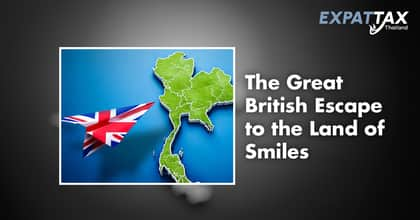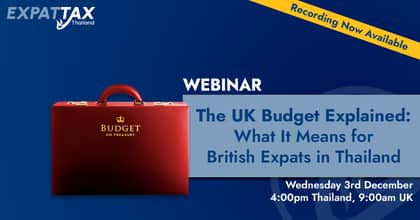If you’re an expat living in Thailand, planning your estate might not be at the top of your to-do list. But what would actually happen to your Thai property, bank accounts or digital assets if something happened to you tomorrow?
Without a valid Thai will—and a properly structured estate plan—your loved ones could face a long and confusing probate process, unexpected tax issues, or even lose access to what you intended to leave behind. And if your assets span multiple countries, the risks multiply quickly.
The truth is, estate planning for expats isn’t just about writing a will. It’s about understanding how Thai inheritance law works, how it interacts with your home country’s rules, and how to protect your estate—so your family doesn’t have to pick up the pieces later.
Common Expat Estate Planning Challenges in Thailand
If you’re living in Thailand, it’s not enough to rely on a will from your home country. Thai inheritance law works differently, and failing to put a local estate plan in place can leave your loved ones facing serious delays, legal hurdles, or even losing access to what you’ve left behind.
Thai Inheritance Law is Different
Thailand’s legal approach to wills and inheritance can catch expats off guard. Many of the assumptions you might bring from your home country—like automatic spousal inheritance or seamless probate—don’t apply here.
Key differences include:
- There’s no automatic right of inheritance for spouses: Your Thai or foreign spouse doesn’t automatically inherit everything unless they’re clearly named in a Thai will.
- Foreign wills are not automatically accepted; They may need to be translated, notarised, and legally recognised by the Thai courts—delaying probate and access to your assets.
- Probate is always required: Even with a valid will, the Thai courts must formally approve it before any assets can be distributed. This can take several months.
Overseas Families Struggle Without Local Support
If your heirs or executor are based outside Thailand, they may face even more difficulties:
- Navigating the legal system in a different language
- Providing documents that must be translated and legalised
- Struggling to access the will or initiate probate without local help
- Being excluded from the process altogether due to court or procedural delays
These are preventable problems. With a Thai-specific estate plan, you can give your family clarity, access, and legal standing—when they’ll need it most.
The Land Ownership Trap
Many expats in Thailand invest in property—often through their Thai spouse or under long-term lease agreements. But when it comes to inheritance, land ownership becomes a legal minefield.
Foreigners Can’t Inherit Land
Under Thai law, foreigners are not permitted to own land, even if they inherit it.
This means:
- If a non-Thai heir inherits land, they must sell it within one year
- If they don’t, the authorities can seize and sell the land on their behalf
- These rules apply even if the land is correctly left in a will
Even Thai spouses may encounter difficulties if land is registered solely in the expat’s name or held through informal arrangements. Without clear planning, property issues can cause serious delays and complications for your heirs—and may lead to outcomes you never intended.
One Will or Two? Getting the Structure Right
One of the most common questions expats ask is whether they need a separate will for their Thai assets—or whether their existing foreign will is enough.
The short answer is that it depends. But in many cases, having two properly structured wills—one for Thailand and one for your home country—can prevent confusion, delays and unintended legal conflicts.
A foreign will can be used in Thailand, but as mentioned, it needs to be translated, legalised, and accepted by the Thai courts. This takes time and may not be straightforward. Some banks and government offices may also be reluctant to act on a foreign will, even if it’s legally valid.
There’s also the risk that one will may invalidate another, if they haven’t been carefully worded. This can lead to legal challenges or an estate being treated as partially intestate—meaning Thai law decides who inherits.
If your assets are spread across countries, coordinating your wills is not just helpful—it’s essential.
Many expats are unaware of the legal risks that arise when foreign and Thai wills aren’t properly aligned. The results can be costly and difficult for your family to resolve.
The Tax You (or Your Heirs) Might Not See Coming
Tax is often the last thing people consider when making a will—but for expats, ignoring it can be an expensive mistake. Thai inheritance tax applies to certain high-value assets, and depending on your nationality, your estate may also be taxed in your home country.
In Thailand, inheritance tax is charged at a rate of 5% for direct heirs (such as children or parents) and 10% for others. The tax only applies to certain types of assets—such as land, buildings, bank deposits and securities—and only on amounts exceeding 100 million baht per heir. But for those with significant holdings, it’s a real consideration.
There are also gift tax rules to be aware of if you plan to transfer assets during your lifetime, and capital gains or estate tax issues that may arise abroad—particularly for expats from countries like the UK, US, Canada, Australia or Spain.
Without proper advice, heirs may face tax bills they weren’t expecting or lose the benefit of reliefs and exemptions that could have been used with better planning.
The sooner you understand your exposure, the more options you have to reduce it legally and effectively.
Watch: Estate Planning for Expats in Thailand – Expert Insights
In this webinar, Carl Turner is joined by Neil Chadwick of IFGL Global Trusts to unpack the key issues expats face when planning their estate in Thailand. Drawing on real-world cases, they explain how different jurisdictions handle foreign assets, the challenges of cross-border probate, and the costly pitfalls of poor planning.
They discuss:
What happens if you pass away without a valid will
Why it’s essential to name executors and guardians
Common probate delays when assets are in multiple countries
How to assess and reduce inheritance tax exposure
Special considerations for property, cryptocurrency and US equities
How to structure your will and estate to safeguard your loved ones
The session ends with a detailed Q&A covering Thai wills, digital assets, foreign beneficiaries and more.

What a Complete Estate Plan Looks Like
Estate planning is more than just writing a will. A strong plan brings together all the key elements to ensure your wishes are followed, your family is supported, and your assets are transferred smoothly—with minimal legal or financial stress.
A complete estate plan should include:
- A detailed review of your current assets to identify those—such as certain pensions or investment accounts—where you can name a beneficiary directly. This allows the asset to be passed on without going through probate, which often means faster and simpler access for your loved ones.
- A valid Thai will, properly signed and witnessed in accordance with Thai law
- Coordination with any foreign wills, to ensure they don’t conflict or revoke each other
- A clearly named executor, with a backup if your first choice is unavailable
- A plan for Thai and international assets, including property, bank accounts, investments and business interests
- Provisions for digital assets, such as cryptocurrency or online accounts
- Instructions for guardianship, if you have dependent children
- Awareness of inheritance tax implications, and how to reduce them
- Safe and accessible will storage, with your executor and trusted contacts informed
- A straightforward plan for your beneficiaries, including clear guidance on who to contact and what steps to take when the time comes, ensuring the asset distribution process is smooth and stress-free.
A well-structured estate plan not only protects what you’ve built—it protects the people you care about most.
Take the Next Step
If you’re an expat living in Thailand, now is the right time to get your estate in order. The laws are different. The risks are real. And the longer you wait, the harder it becomes for your loved ones to navigate things when the time comes.
We’ve created a free, practical guide to help you understand your options and start putting a plan in place—whether you’re writing your first will, updating an old one, or dealing with assets across borders.
It covers the key steps every expat should take, explains how Thai law works, and shows you what to watch out for—before problems arise.
Get clear, step-by-step guidance on how to protect your assets and your family.
Need to Talk? If you would like to discuss your situation with our team, please book a free call.


